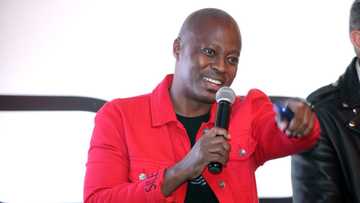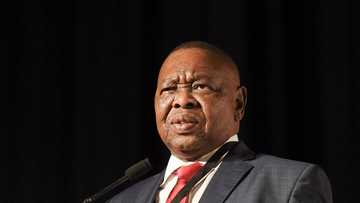Mzwakhe Mbuli's bio: age, spouse, parents, poems, songs, albums, profile
Mzwakhe Mbuli is a South African poet and a Mbaqanga singer. He also served as a Deacon at Apostolic Faith Mission Church in Naledi Soweto South Africa. Read Mzwakhe Mbuli's biography to know how his first two marriages ended, how he met his second wife, his political activism, assassination attempts, and more.

Source: UGC
TABLE OF CONTENTS
- Key takeaways about Mzwakhe Mbuli
- Mzwakhe Mbuli's profile summary
- Mzwakhe Mbuli's biography
- Mzwakhe Mbuli's parents
- Educational background
- Career history
- Mzwakhe Mbuli's poems list
- What are Mzwakhe Mbuli's poems about?
- Mzwakhe Mbuli's albums
- Mzwakhe Mbuli's songs
- What are the achievements of Mzwakhe Mbuli?
- What happened to Mzwakhe Mbuli?
- Assassination attempts on Mbuli
- Who is Mzwakhe Mbuli's spouse?
- Who is Mzwakhe Mbuli's ex-wife?
- What are the interesting facts about Mzwakhe Mbuli?
Key takeaways about Mzwakhe Mbuli
- Mbuli is commonly referred to as The People's Poet or The Voice of Reason.
- His music was intertwined with his political activism and commitment to social justice.
- His songs addressed social and political issues, including apartheid and the resistance to oppression.
- Mbuli was repeatedly detained, harassed, and tortured by the government.
- He was framed with lawsuits and some of his songs were banned.
Mzwakhe Mbuli's profile summary
Full name | Mzwakhe Mbuli |
Nicknames | Tall Man, Mbulism, The People's Poet, or The Voice of Reason |
Birthdate | August 1, 1959 |
Age | 65 years (as of May 2025) |
Zodiac sign | Leo |
Birthplace | Sophiatown, South Africa |
Residence | Mondeor, Johannesburg, South Africa |
Nationality | South African |
Ethnicity | African |
Tribe | Zulu |
Height | over 6 feet (1.8 meters) |
Father | Elijah Katali |
Mother | Roselinah Msuthukazi Mbuli |
Siblings | Sisters and 7 brothers |
Marital status | Married |
Spouse | Zukiswa Damse |
Ex-spouses | Nomsa and Thembeka Ndaba |
Children | 2 |
Son | Mzwakhe Mbuli Jr. (alias Robot Boii) |
Profession | Poet and singer |
Net worth | Estimated $1 million |
Mzwakhe Mbuli's biography
Mzwakhe Mbuli was born on August 1, 1959, in Sophiatown, South Africa. He inherited his musical skills from his father, a mbube (traditional harmonic) singer.
As a youngster, Mzwakhe's dad taught him how to sing traditional mbube songs. He would also take the boy to mbube sessions conducted by his fellow workers.
Additionally, Mzwakhe developed a passion for poems by hearing praise poets performing for visiting kings. He also attended Zulu dance festivals and music events throughout his youth.
Mzwakhe Mbuli's parents
Mzwakhe is one of the seven sons of Elijah Katali, a Zulu man who was employed as a long-distance driver, and his wife, Roselinah Msuthukazi Mbuli.
In 1966, his home village in Sophiatown was destroyed to build a white settlement, forcing his parents, brothers, and sisters to move to Soweto.
Educational background
Following the destruction of his home village, Mbuli relocated to Soweto where he attended local school-based theater groups.

Source: Original
Career history
The 1976 Soweto Uprising riots by black school children in South Africa during apartheid were crucial in forming Mzwakhe's opinions and beginning his career as a poet.
After experiencing the death of his fellow students, Mbuli’s school went on strike and he was encouraged to write poetry and music during this time.
Mbuli made his first steps towards a professional career in 1979 when he performed for the Congress of South African Students (COSAS) as a member of the Khuyhangano group.
In 1981, he recited two poems, Sies and Ignorant, at a memorial concert for a local preacher called Father Castro Moyathula. The event was the “beginning of Mzwakhe” and it would launch his career of reciting “dub” poetry at funerals during the 1980s.
Due to his outstanding performance, Mzwakhe was asked to perform poems at a funeral service at Regina Mundo Church.
Mbuli soon became a regular performer at political and cultural events and built a massive loyal following despite facing resistance from the government.
His other notable performances included the national launch of the United Democratic Front (UDF) in 1983 and the festivities surrounding Bishop Desmond Tutu’s acceptance of the Nobel Peace Prize in 1984.
His debut album, Change Is Pain, was banned by the South African government upon its release in 1987. When asked how he felt when the album was banned, Mzwakhe said:
That was an experiment. This is a sick society. How foolish is the government to decide to ban an experiment before the actual product? I am going ahead with my next album which will be titled 'Likely To Be Banned'.
The banning of 'Change is Pain' has served to motivate and inspire me. They haven't banned my mind yet. I can still produce plays, poetry, dance, and music.
I am joining the masses black and white, as well as the international community, in calling for the unbanning of the outlawed organizations. If that happens, maybe my tape and other people's works could be unbanned.
His second album, Unbroken Spirit, qualified for gold status without radio exposure. In 1989, Mbuli helped welcome back prisoners released from Robben Island in a ceremony.
In 1990, Mbuli began his international career when he performed with Youssou N’dour, Miriam Makeba, and Thomas Mapfumo in Berlin. He also wrote and narrated a history of apartheid in South Africa for BBC Radio which was broadcast in the spring of 1991.
Mbuli would go on to form a band called The Equals, in the early '90s, and set his hard-edged, mostly English, lyrics and deep voice to a fusion of marabi (South African jazz), kwela (pennywhistle music), and mbanqanga.
The band became known for its political lyrics and its performances during the height of Mbuli's career in the 1990s. Additionally, the Equals toured internationally, bringing his message and music to audiences in North America, Europe, and Scandinavia.
By 1994, Mzwakhe had become the crème de la crème of South African music. He performed at the funeral of Chris Hani (the assassinated head of the South African Communist Party) in 1993 and was invited to speak at Nelson Mandela's inauguration in 1994.
Mbuli also performed numerous poems at the local and international levels. In 1996 Mbuli was invited to London to co-host, with British poet and activist Benjamin Zephaniah, the Two Nations Concert at the Albert Hall to honor President Nelson Mandela on his visit to London.
Later in the year, Mbuli returned to the UK to join Peter Gabriel, Youssour N'dour, and other prominent African artists to record the fundraising Aids Album.
In 1997, Mbuli released his first gospel album, Umzwakhe Ubonga Ujehovah. The album was released with bookmarks meant for placekeeping in Bibles.

Source: UGC
Mzwakhe Mbuli's poems list
Mzakhe's poems are mainly in English but draw on his native Zulu as well as traditional praise poetry and rap. Here is a collection of the all-time best famous Mzwakhe Mbuli poems:
- Now Is The Time
- The Day Shall Dawn
- John Peel's Mzwakhe Mbuli - Behind The Bars
- Mzwakhe - The Spear Has Fallen
- Abortionism
- Ngixoleleni Ngemibuzo
- Uma Sizenzela
- Isinamuva
- Useven
- Rape
- God The Best
- Chris Hani... Lest We Forget
- Crocodiles
- The Last Struggle
- The Soul
- Achimurenga
- Alone
- Accused
- Ngizwa Ingoma
- Don't Push Us Too Far
- Mzwakhe Mbuli - Emandulo
- Ivangeli Lakudala
- Afrophobia
- Ukulimala Kwenqondo
- Ukuhleka Akupheli
- The Stone
- Izigi
- Ukufa
- Patriotic Love
- Madiba
- Uzubenam'
- Ujonah
- Voice Of Reason
- Bozisola
- Umabhalane
- Abanabani
- Ngowam' Ujesu (Jesus Is Mine)
- Song For God
- Jesus Never Fails
- Emnqamlezweni
- Kudala
- Confidence Builder
- Noble Peace
- Darling
- Konyana
- Amantongomane
- Chillax
- Change Is Pain
- Song Of The Spirit
- Triple B
- I Have Travelled
- Voice Of Reason
- Inhlanhla
- Ngaphesheya
- Ngenxa Yothando
- Arrive Alive
- Almighty
- Why Tricks Not Solutions?
- Sis! Bayasinyanyisa
- Ezomdeni
- Volovolo
- Thula
- What Life?
- The Day Shall Dawn
- uJehova
- God Bless Africa

Source: UGC
What are Mzwakhe Mbuli's poems about?
His prolific poetry earned him the title "The People's Poet" as his poems spoke loudly and boldly about political and social issues affecting South Africa.
Mzwakhe's best-known poem, "Change Is Pain," is a protest piece about oppression and revolution. The poem was initially banned until growing pressure forced the government to allow more freedom of speech.
His other famous poem, "Crocodiles," addressed the struggles and injustices black people of South Africa faced during the apartheid era. It served as a call to action, urging people to resist and overcome the oppressive forces and systems that sought to destroy them.
Mzwakhe Mbuli's albums
Mbuli has released 17 English-Zulu albums to date of which three were banned by the government of South Africa. His albums are;
Ranking | Year | Album's title |
1 | 1986 | Change is Pain (Banned) |
2 | 1988 | Unbroken Spirit (Banned) |
3 | 1989 | Before Dawn (Banned) |
4 | 1992 | Resistance is Defence |
5 | 1993 | Afrika |
6 | 1996 | Kwazulu Natal |
7 | 1999 | Voice of Reason |
8 | 1999 | Human Triumph |
9 | 1994 | Izigi |
10 | 1997 | UMzwakhe ubonga uJehova |
11 | 1999 | Born Free Always in Chains |
12 | 2004 | Mbulism |
13 | 2006 | All the Hits |
14 | 2006 | Dudula |
15 | 2008 | Thunder |
16 | 2011 | Amandla |
17 | 2013 | Patriotic Love |
Mzwakhe Mbuli's Kwazulu Natal album was extremely successful and controversial for the title track of the song, “Kwazulu Natal."
The song pleaded for an end to the Zulu in-fighting that was taking place between ANC members and Gatsha Buthelezi's Inkatha Freedom Party (IFP) supporters.
The provincial member of the IFP, Nomthandazo Mkhize, actually attempted to have the song and the music video banned.
Mbuli's Kwazulu Natal album is among his top English-Zulu albums. It has eleven tracks:
- Kwazulu Natal
- Confidence Builder
- Kulusizi Emhlabeni
- Our Music
- Lomhlaba
- Freedom Puzzle
- Song Of The Spirit
- Young People
- Katali Special
- Ukuhleka Akupheli
- Kwazulu Natal (Vocal)
Mzwakhe Mbuli's songs
As a singer, he used relatable events from the 20th century in South Africa in his lyrics from the late 1980s to the early 1990s. His other songs would merely speak about the contemporary situations in the country. Some of Mbuli's greatest hits include:
- Kwazulu Natal
- God The Best
- Pitoli
- The Day Shall Dawn
- Emandulo
- Ivangeli Lakudala
- God Bless Africa
- Giya
- Voice Of Reason
- Ukulimala Kwenqondo
- Song for God
- The Stone
- Nkosi Sikelela
- Madiba
- Bozisola
- Izigi
- Confidence Builder
- Sisi Bayasinyanyisa
- Imbokodo
- Abantu Abana Dankie
- Jesus Never Fails
- Ngaphesheya
- Many Years Ago
- Uzubenam'
- Apartheid Police
- Africa Sing
- Ngowam' Ujesu
- Chillax
- Chris Hani... Lest We Forget
- Ndimbeleni
- Vuka Darkie
- Lusaka

Source: UGC
What are the achievements of Mzwakhe Mbuli?
His literary achievements include the book Before Dawn (1989) and albums like Change Is Pain (1986) and Afrika (1993). Internationally, Mzwakhe performed in Berlin in 1990 alongside several esteemed artists. He has also graced significant events like Chris Hani's funeral in 1993 and Nelson Mandela's inauguration in 1994.
What happened to Mzwakhe Mbuli?
His album, Change Is Pain (1986), was the beginning of torture as it garnered him the attention of the authorities. In the 1980s alone, Mbuli was arrested eight times and refused a passport 39 times during the apartheid era because of his anti-apartheid work.
Mzwakhe spent most of 1988 in solitary confinement and used this time to write and memorize his next album while in prison. Upon his discharge in 1989, Mzwakhe immediately recorded and released the album Unbroken Spirit.
Mbuli and his wife, Nomsa, were arrested in their Pimville-Soweto home for possession of two Russian, hand-made grenades on March 17, 1989. Mbuli was subsequently acquitted two years later on February 5, 1991, as a result of insufficient evidence.
Mbuli was declared an official enemy of the State, and besides the ID number, he was allocated a number. After the country attained independence in 1961, he became a victim of the new South Africa's overburdened, painstakingly slow, and sometimes capricious criminal justice system.
On October 28, 1997, he was arrested and charged with armed robbery and denied bail because he was seen as a flight risk. Mbuli languished in jail until his court trial in Pretoria began in June 1998.
In March 1999, he was found guilty and sentenced to 13 years of hard labor at Leeukop Maximum Security prison, until his release in November 2003.
The First National Bank (FNB) in Waverly, Pretoria, was robbed of just over R15,000 shortly after 9 am on October 28, 1997. Twenty minutes later Inspector Barend Brits and Sergeant Hannes Venter pulled over Mbuli's blue BMW about 200 meters from the bank.
Mbuli and his friends, Happy Shikwambane and Ben Masiso were in the car. Mbuli and Masiso both had their licensed firearms on them. The police also found a blue bag containing about R13,000 in FNB-sealed plastic bags.
After some police vans had converged on the scene, a further search revealed a rusty unlicensed star pistol, a hand grenade, and a blue overall.
Although one of the six witnesses pointed out Mbuli in the line-up of the accused, a video surveillance camera in the bank, which might have provided crucial evidence, was inexplicably not switched on at the time of the robbery. Hence, there was no evidence of identity linking Mbuli to the scene of the crime.
Mbuli believed the whole incident was designed to frame him. He claimed he had information about drug dealing by high-ranking government officials, which he obtained after an anti-drug tour to Swaziland.
The frame-up, Mbuli believed, was meant to silence him, prevent him from obtaining evidence confirming the information, or reduce his credibility as a witness. The only incontrovertible piece of evidence against Mbuli, and his friends, was the stolen property found in his car.
Assassination attempts on Mbuli
Mbuli survived four assassination attempts, one being in 1991 after a grenade was thrown into the window of his house. Another attempt on his life was in 1996 after nine shots were fired on his car.
While Mbuli blamed fellow musicians for attempting to kill him, his former publicity agents said the car incident was related to his ties with other women. Mbuli later said it was a former girlfriend attempting to kill him.
The two other assassination attempts made on him were when he was battling an armed robbery lawsuit. Mrs Helen Suzman said there were two attempts to murder him, believing Mzwakhe was a victim of the injustice of the new South Africa.

Source: UGC
Who is Mzwakhe Mbuli's spouse?
Mbuli is living blissfully with his young wife, Zukiswa Damse, at his home in Mondeor, south of Johannesburg. She is a banker by profession and hails from Soweto but her ancestral roots are in Tsomo, in the Eastern Cape.
The duo met in Mogale City West of Jozi in early 2015. They dated for a few months and held a traditional matrimonial ceremony in August of the same year.
According to IOL magazine, eight months after their wedding, Mzwakhe told the press:
We have been running away from gossip columnists since we started going out. We were living a life of hiding. We have been undercover for more than eight months. This interview will demystify the whole thing.
I said Lord, I am looking for a beautiful heart, a woman who will understand the life I live, where I am always called upon to serve at people’s burials, for instance.
Beauty fades, but a woman who fears the Lord stays beautiful forever. If you pray and fast, God will give you umaqondana – the right woman. I was specific in my prayers and I also gave God my taste and preferences.
It was love at first sight when he set his eyes on Damse at Mogale City. Mbuli said:
I saw a beautiful woman, but that was all. I said, she is pretty but nothing came to me to indicate she was the one. I was waiting for a sign.
I went to the second meeting. That’s when I saw her beautiful legs and the level of depth and spiritual maturity she displayed in our conversations. I realised that she might be the one. The second meeting confirmed that she had a good heart and the legs were a bonus.
Then I asked for her number and so began the courtship, not marriage. As you will notice, she speaks less and smiles easily. When she opens her mouth she is not a ‘smartly dressed fool’. We can drive all the way from here to Pretoria and Zuki won’t utter a word. But when she does, she speaks with depth and wisdom.
After he asked for her number:
I wrote a few verses. Those that wait for the Kingdom of God… I am a patient man. I am like an eagle. It flies high yet it aims for and won’t miss a fish down there in the river. Ubumpohlo buphelile (my bachelor days are over).
Who is Mzwakhe Mbuli's ex-wife?
He married Thembeka Ndaba in a traditional wedding ceremony in KwaZulu-Natal in 2010. She is said to have moved out of their home in 2013, furious after Mzwakhe allegedly accused her of witchcraft.
According to a publication by News24, sources told The City Press that he found muti in his home and blamed his wife. It was said that Mzwakhe was seen burning Ndaba's clothes and could be arrested for that.
He also refused to let her pick up some of her things even when she returned to the house with the police on the same day. Ndaba is said to have sued Mbuli for theft later, claiming some of her things, including clothes and jewelry worth R100,000, had disappeared from the house.
Who was Mzwakhe Mbuli's first wife?
Before his second marriage with Thembeka Ndaba, Mbuli was married to Nomsa for 26 years and the two share two children. According to a publication by IOL on July 12, 2008, Nomsa filed for divorce in 2007 claiming he was abusive.
The magazine also reported that she had laid assault charges against him in December 2006, but the charges were withdrawn a month later.
In July 2008, Mzwakhe faced arrest after Nomsa sought a protection order against him. She alleged Mbuli kicked her out of their home in Mondeor, southern Joburg, and had become aggressive towards her.
IOL reported that she told the Saturday Star:
On Thursday evening last week he locked me outside the house and left. When he returned at midnight and found me inside, he became aggressive. He grabbed me and locked me out again.
As she sat outside in the cold screaming for help, Mbuli allegedly played his latest CD loudly to drown out the sound. After the incident, Nomsa sought a protection order from the Family Court, which Mbuli refused to sign when it was delivered to the house. He also allegedly refused Nomsa entry to the house to fetch clothes in the presence of police.
The distraught wife said:
He's acting like he is a law unto himself. He told the police that the house belonged to the Mbulis and no one would tell him what to do. He gave away a bed I have been sleeping on since we separated a year ago.
My children are witnessing all this madness. Mzwakhe has no respect for a woman. He treats me like I'm nothing. We're all scared of him in the family.
This was barely a month after Mzwakhe had been granted bail of R2,000 in a case of assault, kidnapping, and pointing a firearm at a Leondale businessman, Philemon Masike, and his assistant, Maki Matsepo, demanding to be told who killed his uncle, Mandla Mbuli.

Source: UGC
What does Mzwakhe Mbuli's son do?
His son, Mzwakhe Mbuli Jr., is a South African dancer, singer, and presenter. He uses the stage name Robot Boii and is famously known for his performances and music, particularly hits like Salary Salary, Uxolo, and Mwagia Ndani.
Robot Boii wishes to create a legacy in the entertainment industry on his own. He won the 2023 Trace Africa Award for Best Dancer in Africa. Speaking to Mail Guardian, he said:
I don’t really have mentors in my life, but I’ve had spiritual leaders in my life like Carl Dinkelman in my early years of varsity. But being able to work alongside people like DJ Sbu and Zola 7, as well as my father, has had a huge effect on my life.
Are Letta Mbulu and Mzwakhe Mbuli related?
Letta, a South African jazz singer, is not related to Mzwakhe, a South African singer/author/poet. Nonetheless, both artists are from Soweto.
Mzwakhe Mbuli's net worth
According to Wikisouthafrica, Mzwakhe has an estimated net worth of $1 million as of 2025. He has earned a significant sum of money from brand endorsements and his career as a singer and poet.
By 1997, Mbuli had made R20,000 for each festival performance and R15,000 for each indoor performance. Before his major arrest in 1997, he signed an R500,000 contract with Spoornet to create a commercial in six languages after also doing advertisements for Nestle’s Cremora milk powder.
Mbuli's social media presence
He is believed to have an active Instagram page, @mzwakhembuli, and a Facebook account, @Mzwakhe0.
What are the interesting facts about Mzwakhe Mbuli?
- Mbuli often wore traditional African clothing and started his poems with a speaking tone.
- He is the co-founder of the Crown Gospel Awards and Siyabakhumbula.
- In 2008, he was awarded the Heritage Award from the Kwazulu Natal Arts, Culture, and Tourism Department for his 2007 single, God the Best.
- In 2013, Mzwakhe collaborated with Zahara on a Mandela song, which was an instant hit.
- In 2014, he was appointed an INTERPOL AMBASSADOR as part of an antipiracy activism.
Mzwakhe Mbuli's biography explains how he has struggled to remain relevant in the changing times. With the fall of the apartheid government, the lyrical substance of his work has shifted. Apart from his gospel music, Mbuli’s more recent work has focused on social issues such as HIV/AIDS, and drunken driving.
Briefly.co.za covered the biography of Mila Guy, a South African actress and costume designer. She is famous for playing Melanie Schmit in Hotel and Lana Basson in 7 de Laan soapies.
Mila Guy was born in Nelspruit, but she lives in Linden, Johannesburg. She studied Bachelor of Drama at the University of Pretoria and is married to Ben Fourie.
Source: Briefly News

Peris Walubengo (Lifestyle writer) Peris Walubengo has vast experience in search engine optimization through digital content generation, research, editing, and proofreading. She joined Briefly.co.za in November 2019 and completed the AFP course on Digital Investigation Techniques. You can email her at perisrodah254@gmail.com.

Salma Rashid Salma Rashid is a journalist with over three years experience in the digital world space. She holds a Degree in Purchasing and Procurement Management from Mount Kenya University. Salma has been writing for Briefly since 2019 and has grown to become a specialist at creating stimulating blog posts. Email: salmarashidabdul@gmail.com


















